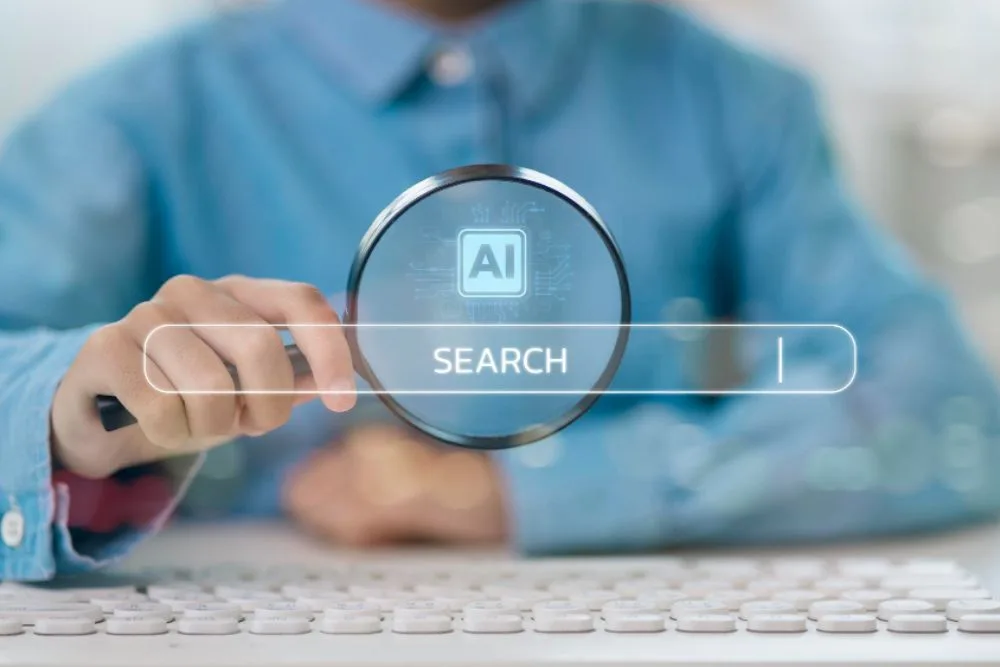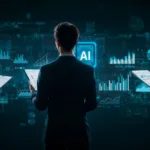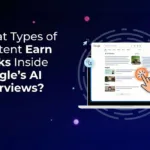Search engine marketing has undergone a massive transformation, caused by the rapid and increasing integration of Artificial Intelligence (AI). SEO is no longer just about keywords, links and manual work, it’s now growing into a smarter, AI-powered world. This transformation presents both immense opportunities and significant challenges for marketers. The question is not if AI will reshape search marketing, but how quickly and effectively you and your strategies will adapt.
For years, AI has been slightly influencing search engine algorithms. Google’s RankBrain, a machine learning system, has been an essential part of their ranking algorithm since 2015, helping to understand the meaning behind search queries and deliver more relevant results. However, the recent wave in refined AI models, particularly in natural language processing and generation, is balanced to revolutionize every aspect of search marketing, from content creation and SEO optimization to paid advertisement and performance analysis.
The AI Revolution: What’s Already Here and What’s Coming?
We are already witnessing the impact of AI in several key areas of search marketing:
- Enhanced Keyword Research: AI tools can analyze vast amounts of data to identify not just high-volume keywords, but also long-tail variations, emerging trends and user intent with exceptional accuracy. These tools can go beyond simple keyword suggestions, providing insights into the semantic relationships between terms and identifying content gaps that marketers can capitalize on.
For example, an AI-powered tool might show that “best digital marketing company” is a highly searched term and there is a rising interest in more specific queries like “best digital marketing company for small businesses in Dubai” — a local keyword that may have lower competition but higher goals from potential clients. - Smarter Content Creation: AI writing assistants are becoming increasingly sophisticated, capable of generating various forms of content, from blog posts and website copy to social media updates and email marketing campaigns. While these tools may not entirely replace human creativity, they can significantly speed up the content creation process, help overcome writer’s block and ensure consistency in brand voice.
Imagine an AI tool that can generate multiple ad copy variations based on a single product description or create a series of FAQs based on customer reviews. A Digital Marketing Company can utilize these tools to scale content creation efforts for their clients. - Hyper-Personalized SEO: AI can analyze user behavior data at a detailed level to understand individual preferences and customize search results and website experiences accordingly. This means that the same search query might produce slightly different results for different users based on their past interactions, location and other factors.
For marketers, this necessitates a transformation towards understanding audience segments and creating content that serves diverse needs and objectives. - Optimized Paid Advertising: AI algorithms are already heavily used in platforms like Google Ads and social media advertising to automate bidding strategies, target audiences more precisely and optimize ad creatives for maximum ROI. Future AI advancements will likely lead to even more dynamic and personalized ad experiences, where ads are designed in real-time to individual users based on their context and behavior.
- Predictive Analytics and Reporting: AI can analyze vast datasets of marketing performance metrics to identify patterns, predict future trends and provide actionable insights. This allows marketers to proactively adjust their strategies, allocate budgets more effectively and measure the impact of their campaigns with greater accuracy.
Imagine an AI dashboard that not only shows current campaign performance but also predicts future outcomes based on historical data and external factors. Businesses offering Web Design and Development Services can use these analytics to demonstrate the ROI of their optimized websites.
The Challenges of an AI-Driven Future:
The potential benefits of AI in search marketing are significant, but there are some challenges that marketers need to be prepared for:
- Maintaining Authenticity and Creativity: Over-support on AI-generated content could lead to a homogenization of online content and a decrease in originality and brand personality. Marketers will need to find the right balance between using AI for efficiency and preserving the human touch that connects with audiences.
- The Role of a Marketer: The role of the search marketer will probably turn towards strategic thinking, creative direction and managing AI-powered tools. Marketers will need to develop new skills in rapid engineering, AI oversight and data interpretation. Teams within a Website development service provider will need to integrate AI insights into their design and development processes.
- Ethical Considerations: The use of AI in marketing introduces ethical concerns related to data privacy, algorithmic bias and the potential for manipulation. Marketers will need to be mindful of these issues and ensure that their AI-driven strategies are ethical and transparent.
- Keeping Up with Rapid Technological Advancements: The field of AI is growing at an extreme speed. Marketers will need to commit to continuous learning and adaptation to stay ahead and use the latest AI innovations effectively. This might involve investing in new tools, training staff and experimenting with emerging AI technologies.
- The Potential for Increased Competition: As AI-powered tools become more accessible, the barrier to entry in search marketing might lower, leading to increased competition. Marketers will need to find ways to differentiate themselves and adapt AI in unique and creative ways to stand out.
Preparing for the AI-Powered Future:
So, are you ready for the AI-driven changes in search marketing? Here are some steps you can take to prepare:
- Adopt AI Tools and Experiment: Start exploring and experimenting with various AI-powered tools for keyword research, content creation, SEO analysis and paid advertising. Familiarize yourself with their capabilities and limitations. For example, try using AI writing assistants to draft initial content outlines or generate social media posts.
- Focus on Strategic Thinking and Creativity: Recognize that AI will handle many tactical tasks. Sharpen your strategic thinking skills, focus on understanding your target audience deeply and cultivate your creativity to develop effective and authentic brand records.
- Invest in Data Literacy: Develop your ability to understand, analyze and interpret data to inform your marketing decisions and evaluate the performance of AI-driven campaigns.
- Prioritize Quality and User Experience: In an AI-driven landscape, high-quality, user-centric content and smooth website experiences will be more essential than ever. Focus on creating valuable content that meets user needs and optimizing your website for speed, usability and mobile-friendliness.
- Stay Informed and Adaptable: Continuously learn about the latest AI developments in search marketing. Follow industry news, attend webinars and engage with online communities to stay informed and be prepared to adjust your strategies with the trend.
- Consider Ethical Importance: Be mindful of the ethical concerns surrounding AI marketing and ensure your strategies are responsible and transparent.
The integration of AI into search marketing is not just a trend; it’s a fundamental transformation that will redefine how we approach online visibility and customer engagement. The changes may seem challenging, but they also deliver exceptional opportunities for marketers who are willing to adopt innovation and adjust their strategies. Understanding how AI is shaping search marketing helps you tackle challenges early and focus on the field. There’s no better time to start than today.




